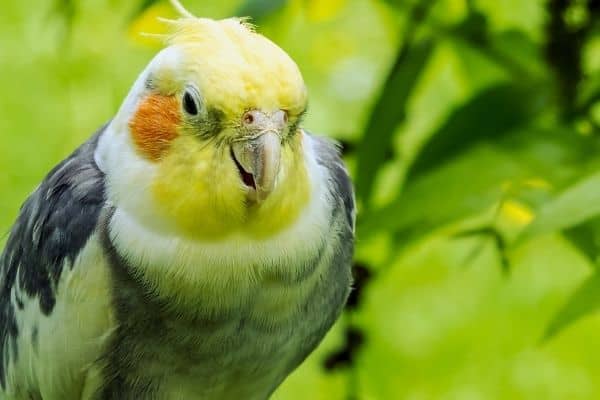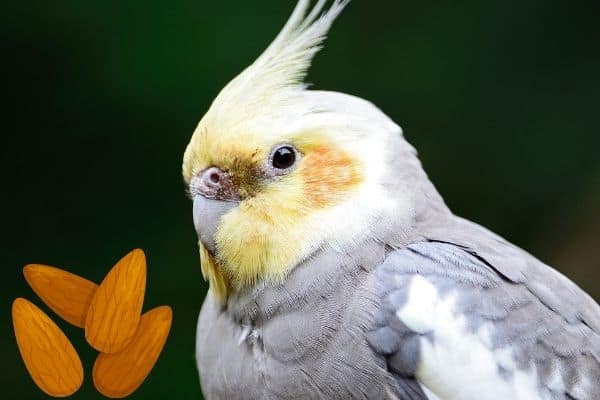A big yes! Cockatiels can eat almonds as they are healthy and make a tasty nutty treat. But when you feed almonds, do not feed with the shell. Also, as snacks for a cockatiel, they should be unsalted, roasted, and in smaller quantities. Take care of these things, and your cockatiel is up for a healthy snack.
Like many other nuts, Almonds come with a host of nutritional benefits while being tasty for your cockatiel. And there can be no other better reason for your bird to feed on them.
However, almonds also come with some dos and don’ts you should be aware of, as with other nuts. This article will prove informative in answering your questions and giving your cockatiel just what it needs.
Are Almonds Healthy For Cockatiels
Almonds can be an enjoyable treat for cockatiels. They are tasty and packed with nutrition, making them ideal as snacks for cockatiels.
An ounce or roughly a 28-gram serving of almonds provides nutrients as below
- 164 Calories for energy
- Carbohydrates 6.1 g
- Fat 14.2 g
- Fiber 3.5 g
- Protein 6 g
That’s not all. Almonds have a substantial amount of vitamins and minerals, as stated below
- Magnesium 76.5 mg
- Calcium 76.3 mg
- Vitamin E 7.27 mg
- Potassium 208 mg
- Copper 0.3 mg
- Iron 1.0 mg
- Phosphorous 136 mg
- Zinc 0.9 mg
- Manganese 0.6 mg
- Monounsaturated fat 10 g
- Selenium 1.2 mcg
- Folate 12.5 mcg
The above minerals and vitamins can benefit your cockatiel in their own ways.
- Manganese improves growth, metabolism, clotting, and reproduction.
- Vitamin E enhances the responsiveness to stress.
- Magnesium helps build nerves and muscles. It also enhances the immune system and blood pressure regulation.
- Phosphorous works for the maintenance and formation of bones.
- Vitamin B12 helps in the conversion of food to energy.
These are testimonial facts of how almonds can be highly beneficial. But that doesn’t mean that you will feed your cockatiel only almonds as much s you would want. With the blessings almonds provide, they also come with some risk factors. It is always best to feed them in moderation for your bird’s safety.
How Many Almonds Should You Feed Your Cockatiel
We all know immoderation of everything can be terrible. That said, you should feed your cockatiel only as many almonds s they would need in moderation. To be precise, you shouldn’t provide more than 3 to 4 grams in a day.
As a snack, almonds should contribute to only 10% of a cockatiel’s diet, amongst other snacks like fruits and seeds.

The primary composition of their meals should be from pellets contributing to 60% of their diet. The other 30% should come from carrots, vegetables, and fruits such as raisins and grapes.
A cockatiel should typically eat about 35-40 grams of meal a day, to which seeds almonds be approximately 4-5 grams in a day. Remember two words when feeding your little bird friend- balance and moderation.
Along with almonds, you can also incorporate other nuts in their snacks, such s peanuts, walnuts, hazelnuts, to name a few.
Can Almonds Be Risky For Cockatiels
Along with nutrition, there can also be some risk factors for feeding almonds to cockatiels.
Copper in Almonds
As seen above in nutritional facts, almonds have copper. It can do more harm to birds than help. And this is one reason why you should limit your bird’s consumption of almonds to curb excessive copper intake.
To be precise, 1.5 grams of almonds in a day should be just fine. But, it will be even better to feed almonds a maximum of twice a week.
Almond shells
There is an anti-nutrient called phytic acid that is present in almonds. This substance works in binding some minerals leading to low mineral absorption. Phytic acid may be an antioxidant, yet it reduces the absorption of calcium, zinc, and iron that your pet could otherwise take.
You May also read Can cockatiels eat walnuts?
Hence, it’d be best to roast the almonds first before feeding and make sure to remove the shells. This method reduces the function of the above acid.
Salted Almonds
Many almonds come salted with added seasonings and flavors. While the taste can cause no harm to humans, it can act otherwise in birds. Salt in almonds can disrupt the fluid and electrolyte balance in your bird’s system. It can further lead to kidney malfunction, dehydration, and even death. It should be a reason good enough to avoid salted almonds.
Mold growth on almonds
Almonds may gather molds if not stored correctly or in wet and damp places. The mold produces fungus, which can be highly toxic for your cockatiel. As a general principle, don’t feed almonds that you don’t find fit to et yourself.
Always store almonds in cool and dry storage areas to prevent molding, and remove shells before feeding.
Large portions
As emphasized earlier, feeding in moderation is very crucial. While almonds are nutritious and healthy, they shouldn’t make up for most of the diet. That’s because these nuts, like other nuts, are mere snacks and do not add up as the main meal.
You may want to crush the almonds into tiny crumbs before feeding so that your bird can enjoy eating them and swallow with ease. This step is vital because almonds are typically significant in size.
Other nuts that cockatiels can eat
Aside from almonds, there is a range of other nuts that your cockatiel would love to eat. Just make sure you follow the same precautionary steps with feeding them. They are,
- Beechnut
- Cashews
- Gumnut
- Macadamia
- Roasted peanuts without shells
- Pili nut
- Pistachios
- Roasted almonds without shells
- Brazil nut without shells
- Coconut
- Hazelnut
- Palm-nut
- Pecan
- Pine nut
Summary
To sum up, yes, almonds are a healthy and nutritious snack for your beloved cockatiel. All you need to ensure is to keep the risk factors in mind. Feed almonds in moderation or 3 to 4 grams a day and avoid salted and seasoned almonds. Lastly, do not ever include shells when feeding nuts. A balanced diet is an answer to a healthy and cheerful cockatiel.
